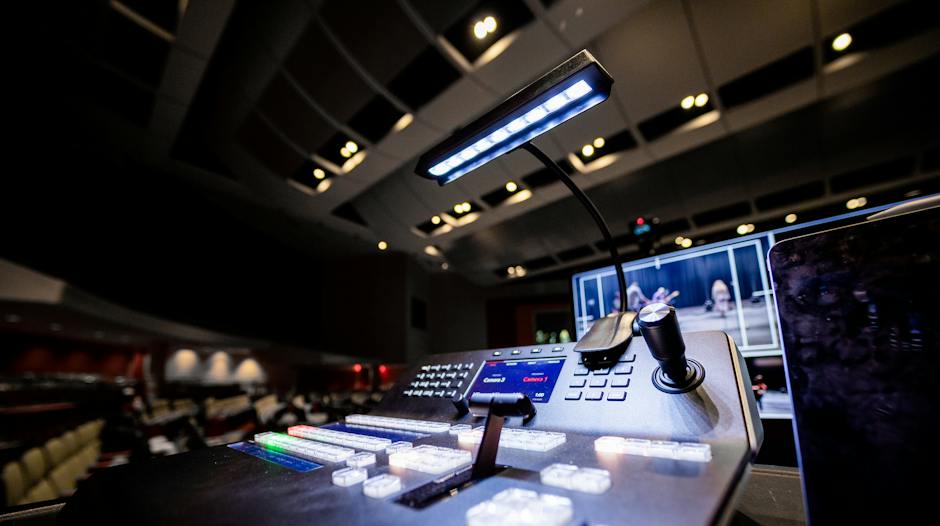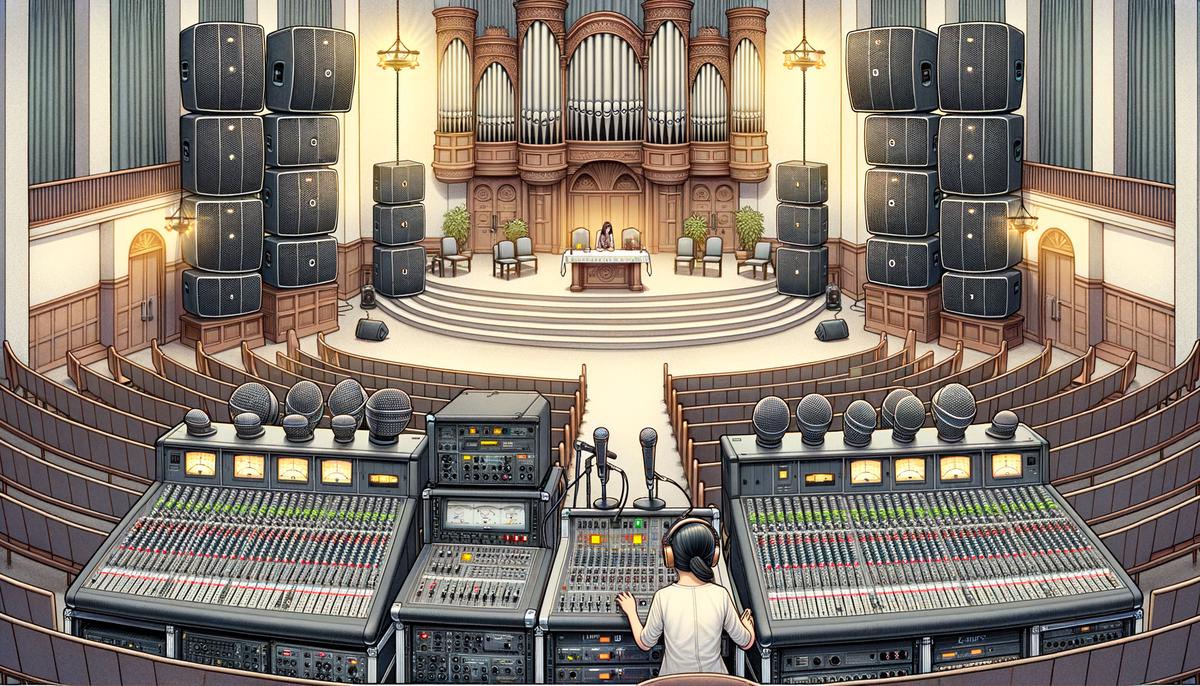Choosing the right sound system for your church is about more than just buying speakers; it’s about ensuring every sermon and song reaches everyone in the congregation clearly. This article will guide you through the various factors that must be considered to achieve an auditory experience that complements and enhances worship services. From the size of the church to the type of services and the importance of future-proofing, we’ll explore what makes a sound system effective and how to select one that serves your congregation’s needs. Let’s take a look at the best church sound system packages.
Understanding Sound System Needs for Churches
Selecting the Right Sound System for Your Church
When it comes to enhancing the worship experience in a church, the quality of the sound system plays a pivotal role. A well-designed sound system ensures that messages and music are delivered clearly and effectively to the congregation, regardless of where they are seated. But what exactly determines the specific requirements for your church’s sound system? Let’s delve into the key factors that influence this crucial decision.
Size of the Congregation and Venue
First and foremost, the physical dimensions of the church and the average number of attendees are critical considerations. Larger spaces with higher ceilings require more powerful speakers to fill the room without sacrificing sound quality. Similarly, a greater number of congregants means a more extensive coverage area is needed, possibly necessitating additional speakers strategically placed to prevent any acoustic dead zones.
Architectural Acoustics
The acoustics of a building can significantly impact sound propagation. Materials used in the construction of the church, such as wood, glass, or concrete, along with the presence of carpets, can absorb or reflect sound. These architectural details need to be taken into account to ensure the sound system is tailored to minimize echoes and reverberations, thus preserving the clarity of the audio.
Type of Services
The nature of the services held in the church also influences sound system requirements. Churches that regularly host musical performances, including those with live bands or choirs, might require a system with a wider frequency range and the capacity for higher sound pressure levels without distortion. In contrast, a congregation that primarily focuses on spoken word sermons might prioritize clarity and speech intelligibility.
Future Expansion Plans
Anticipating future growth or changes in usage is vital when choosing a sound system. Opting for a scalable system that can be easily upgraded or expanded allows the church to adapt to increased attendance or alterations in service style without the need for a complete sound system overhaul.
Budget Constraints
While the budget should never compromise the primary goal of clear and effective sound delivery, it inevitably plays a role in the decision-making process. Investing in a high-quality sound system that meets the church’s current needs while accommodating potential future requirements can offer better long-term value than constantly making smaller upgrades.
Integration with Existing Systems
Lastly, the new sound system must be compatible with any existing audiovisual equipment the church might already use, such as microphones, instruments, or recording devices. Seamless integration ensures a smooth transition and avoids potential issues with connectivity or sound quality.
In conclusion, determining the specifications for a church’s sound system requires careful consideration of various factors, including the size and acoustics of the venue, the type of services, future plans for the church, budget constraints, and the need to integrate with existing technology. Addressing these elements ensures that the chosen sound system enhances the worship experience through high-quality, clear sound that engages the entire congregation.

Core Components of Church Sound Systems
Understanding the essential components of an effective church sound system is vital to ensure clear and immersive audio quality for congregational services and events. Here, we dive deeper into the specifics of what makes a church sound system not just functional, but exceptional.
Microphones: Central to any sound system, microphones capture the speaker’s or performer’s voice and instrument sounds. A church may require a variety of microphones, including handheld, lapel, and headset mics for pastors and choir members, as well as condenser microphones for capturing choirs or musical instruments. The choice depends on the specific needs of the service and the acoustics of the space.
Mixers: The mixer acts as the central hub for your sound system, allowing control over which sounds are amplified and how they’re balanced. It blends the audio inputs from microphones, instruments, and other sources. A mixer with sufficient channels for your congregation’s needs, along with user-friendly controls, is crucial. Some mixers also offer effects like reverb that can enhance the quality of the audio output.
Speakers: The choice of speakers is critical to distributing sound evenly throughout the venue. The size and shape of the room, along with its acoustics, will dictate whether you need point source speakers, line arrays, or ceiling speakers. Moreover, considerations such as speaker placement and the potential need for subwoofers to enhance low-frequency sounds are fundamental to achieving clear, impactful audio delivery.
Amplifiers: Amplifiers boost the processed audio signals to levels suitable for driving the speakers. The power requirements of your speakers, as informed by their wattage rating and the size of your venue, will determine the necessary strength and number of amplifiers. Ensuring that your amplifiers are matched correctly with your speakers is essential for optimal sound performance and the longevity of your equipment.
Cables and Accessories: High-quality cables are the lifelines of an effective sound system, providing the connections between microphones, mixers, amplifiers, and speakers. Investing in durable, high-grade cables can significantly reduce signal loss and interference. Additionally, accessories like stands for microphones and speakers, protective cases for equipment, and rack mounts for mixers and amplifiers contribute to a system’s ergonomics and longevity.
Sound Processing Equipment: Equalizers, compressors, and feedback suppressors fine-tune the audio experience. An equalizer allows you to adjust the balance between different frequencies, ensuring clarity and reducing muddiness. Compressors help maintain consistent volume levels, particularly important in dynamic worship services. Feedback suppressors detect and eliminate feedback, preserving the integrity of the service.
Audio Recording and Streaming: In the digital age, the capability to record or live-stream services is increasingly important. Integrating recording equipment and setting up for digital streaming expands the reach of the church’s message beyond the physical boundaries of the venue.
When assembling a sound system, collaboration with a sound engineer or a consultant specializing in church audio can be invaluable. They can provide tailored advice and help navigate technical aspects tailored to your congregation’s unique needs and characteristics.
In conclusion, building an effective church sound system is a multifaceted process that involves understanding the interplay between various components and how they fit into the specific environment of your church. Paying attention to microphones, mixers, speakers, amplifiers, cables, sound processing, and digital expansion capabilities will lay a solid foundation for a sound system that enhances worship experiences and fosters a sense of community. In embracing these components with careful consideration, churches can achieve an audio system that resonates with clarity and purpose.

Selecting the Right Sound System Package
Selecting the perfect sound system package for your church involves more than just understanding your current needs; it’s also about foreseeing potential future requirements. This article dives deeper into considerations such as the importance of professional installation, warranties, and training for your sound team, as well as how environmental factors can impact your sound system’s performance.
Firstly, a critical step often overlooked in choosing a sound system is the professional installation of the equipment. While it might be tempting to save costs by opting for a DIY approach, professional setup ensures that every component is correctly installed and optimized for your space. This could include the strategic placement of speakers to maximize sound coverage and the expert calibration of audio levels to minimize feedback and echo. A professional installer can also identify potential issues that may not be apparent to those without a technical background in sound systems, such as electrical interference from other devices.
Warranties offer peace of mind but also speak volumes about the quality and reliability of the audio equipment you’re selecting. A comprehensive warranty can cover anything from manufacturing defects to certain types of damage, ensuring that your investment is protected. When comparing sound system packages, pay close attention to the warranty terms. Longer warranties or those offering more extensive coverage may indicate higher quality and durability of the equipment.
Equally important is the provision of training for your church’s sound team. A high-quality sound system can only perform as well as the people operating it. Look for suppliers or installers who offer comprehensive training on the use and maintenance of the sound system. This training should not only cover the technical aspects of operation but also troubleshooting common issues and performing basic repairs. Having a well-trained sound team can significantly enhance the audio experience of your services and extend the lifespan of your equipment by ensuring it is correctly used and maintained.
Environmental factors can also play a significant role in the effectiveness of your church’s sound system. Consider the impact of external noise sources, such as traffic or construction, and how they might affect the clarity and audibility of your services. Additionally, seasonal changes can influence the acoustics of your venue; for example, hard surfaces can become more reflective in colder temperatures, altering sound propagation. Understanding these environmental nuances can guide the selection of sound equipment better suited to adapt to these variations, ensuring consistent sound quality year-round.
In conclusion, the journey toward selecting the perfect sound system package for your church doesn’t end with identifying the right components. The considerations of professional installation, comprehensive warranties, specialized training for your sound team, and the impact of environmental factors play pivotal roles in ensuring the longevity and performance of your audio equipment. Taking these additional steps not only enhances the auditory experience of your congregation but also secures your investment in quality sound for years to come.
Installation and Optimization Tips
To further ensure your church’s sound system operates at its peak performance, let’s delve into additional yet crucial aspects that can significantly influence the system’s effectiveness. These complementary measures, when integrated thoughtfully, can elevate the auditory experience for all attendees, fostering a more immersive and engaging environment during services.
Upkeeping a Sound System: Regular maintenance is key. Dust accumulation can severely impact the quality and lifespan of audio equipment. Instituting a routine cleaning schedule prevents dust from encroaching on mixers, amplifiers, and other crucial components. Also, periodically checking cables for wear and tear can avert sudden audio failures during services. This preventative approach not only maintains sound quality but also safeguards the church’s investment in its audio infrastructure.
Software Updates and Upgrades: In the digital era, keeping your system’s software updated is as vital as its physical upkeep. Manufacturers often release updates that enhance functionality or fix known issues. Timely application of these updates keeps your system running smoothly and can introduce new features that enrich the sound output. Furthermore, consider future-proofing your system by opting for equipment that allows for easy updates or upgrades. This foresight ensures your system remains compatible with evolving technology standards and can adapt to new formats of worship services or musical performances.
Feedback Loops and Sound Checks: Establishing a ritual for pre-service sound checks can dramatically reduce the chances of feedback occurrences and ensure volume levels are suitable for every section of the venue. During these checks, it’s beneficial to simulate different scenarios, such as solo performances, choirs, or multimedia playback. This practice helps in identifying any potential sound quality issues before they impact a live service.
Community Feedback: Lastly, never underestimate the value of feedback from the congregation. Encouraging members to share their audio experience can provide insights that technical teams might overlook. For instance, certain areas of the venue may consistently experience audio dead zones or excessive reverb that only attendees in those sections would notice. Acting on such feedback can lead to strategic adjustments that significantly improve the overall sound quality.
By embracing these strategies—routine maintenance, software vigilance, sound checks, and community feedback—a church can remarkably enhance the performance and reliability of its sound system. This not only ensures a high-quality auditory experience for worship but also reinforces the message being shared, creating a more inclusive and spiritually fulfilling environment for all who attend.

Emphasizing the right approach towards selecting, maintaining, and optimizing a church sound system ensures that your congregation’s spiritual experience is never compromised by poor audio quality. By considering the size of the venue, the architectural acoustics, type of services, and engaging with professional advice for the installation and future needs, churches can create a sonic environment that supports and enhances the message. Remember, a well-designed sound system is not just about technology; it’s an extension of your church’s commitment to clear communication and inclusive community worship. Let these insights guide your decisions to foster a more immersive and engaging spiritual atmosphere.













